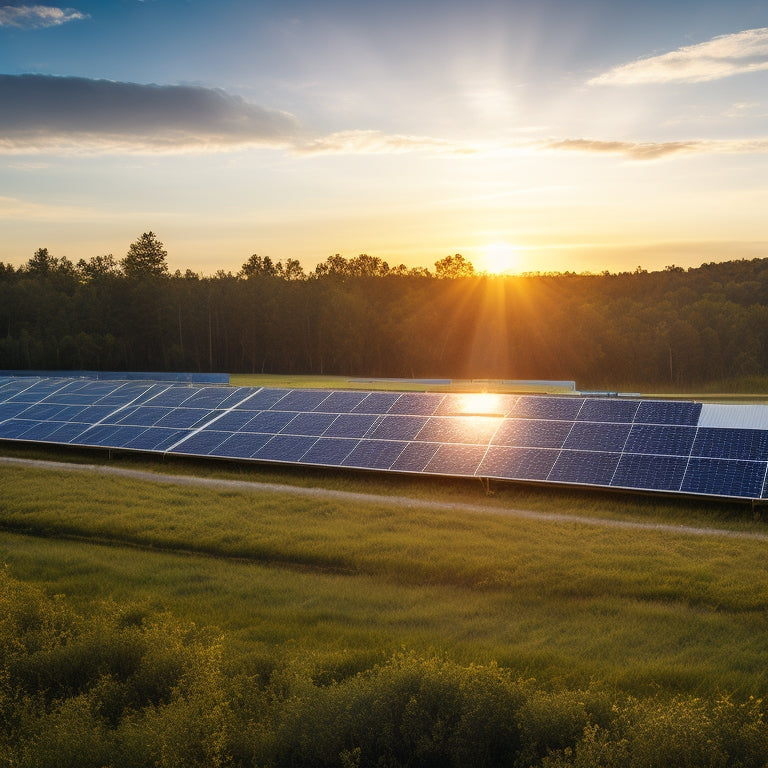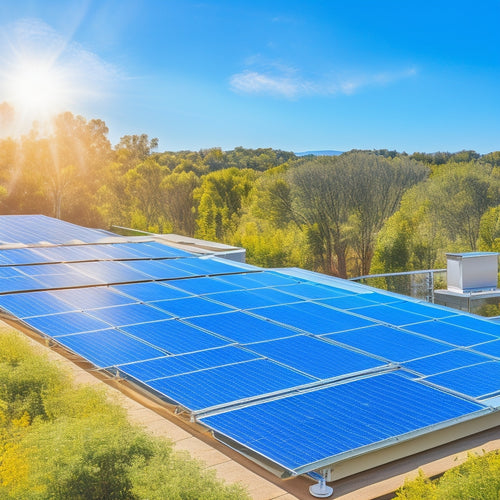
Solar Power Systems With Battery Storage
Share
You're evaluating a solar power system with battery storage to guarantee a reliable and efficient energy supply, providing you with grid independence and uninterrupted power during outages. With a solar power system, you'll have backup power assurance, protecting your sensitive electronics from surges and data loss. You'll also increase your property value, enhance its aesthetic appeal, and lower your carbon footprint. When selecting a battery, you'll need to take into account factors like cycle life, energy storage capacity, and maintenance strategies. By understanding your energy demands and usage patterns, you can design an efficient system that meets your needs - now, take the next step in guaranteeing a seamless shift to renewable energy.
The Essentials
- Solar power systems with battery storage provide reliable backup power during outages, ensuring grid independence and maintaining critical loads.
- Battery backup protects sensitive electronics from surges and data loss, and systems switch seamlessly to battery power during outages.
- Deep cycle battery technology is crucial for optimal energy storage, with key factors including cycle life, energy storage capacity, and maintenance strategies.
- Assessing energy demands and usage patterns is essential for designing an efficient solar system, considering household size, device types, and daily energy consumption.
- Solar power systems with battery storage significantly reduce carbon footprint by utilizing renewable energy and decreasing reliance on fossil fuels.
Reliable Power During Outages
You can rest confident that your solar power system will provide reliable power during outages, guaranteeing grid independence and backup power assurance.
With a solar power system, you're no longer at the mercy of the grid, and can enjoy uninterrupted power supply even when the utility grid fails.
This innovative solution solves the problem of spoiled food and guarantees your safety and comfort during extended outages.
This means that your critical loads, such as refrigeration, lighting, and communication systems, will remain operational, guaranteeing your safety and comfort during extended outages.
Grid Independence Guaranteed
The reliability of solar power systems lies in their ability to provide grid independence, ensuring a consistent flow of electricity even during power outages. You can rest assured that your home or business will remain powered, even when the grid fails. This is especially vital for those who require a steady supply of electricity, such as hospitals, communication centers, or homes with critical medical equipment.
With a reliable home battery backup system, you can prevent food spoilage and maintain safety during outages. Additionally, it protects sensitive electronics from damaging power surges and data loss, providing homeowners with peace of mind and saving them from costly repair or replacement expenses.
With a solar power system and battery storage, you're in control of your energy autonomy. You're no longer reliant on the grid, and you can enjoy sustainable living without interruptions. During an outage, your system will seamlessly switch to battery power, providing you with a dependable source of energy. This means you can continue to power your essential appliances, keep your lights on, and maintain your daily routine without disruption.
Backup Power Assurance
Nearly 70% of solar power system owners prioritize backup power guarantees, and for good reason: it's the ultimate safeguard against unexpected outages. You want to make certain your home remains powered, even when the grid goes down.
With a solar power system and battery storage, you can enjoy reliable power during outages, giving you peace of mind and energy resilience. By incorporating a Home Battery Backup system, you can prevent costly losses due to food spoilage and damage to electronics Renewable Energy Systems, and guarantee continuous power supply for essential systems like medical equipment and security systems.
This setup allows you to store excess energy generated by your solar panels during the day, so you can use it at night or during power outages. By incorporating sustainability practices into your energy management, you'll reduce your reliance on the grid and minimize your carbon footprint.
When the grid fails, your solar power system with battery storage will seamlessly take over, providing backup power guarantees and keeping your essential appliances running. With this setup, you'll enjoy freedom from grid dependence and the confidence that comes with knowing you're prepared for whatever life throws your way.
Increased Property Value
You'll find that installing a solar power system can greatly enhance your property's value, making it more attractive to potential buyers if you decide to sell.
This increased value is largely due to the higher resale value that comes with having a clean, renewable energy source.
Additionally, many homeowners are now prioritizing energy efficiency and reducing their carbon footprint, making solar-powered homes more desirable.
The sleek, modern design of solar panels can also enhance your property's aesthetic appeal, further increasing its desirability.
Higher Resale Value
Installing a solar power system can greatly enhance your property's resale value, making it a smart investment for homeowners. Not only do solar panels provide a clean source of energy, but they also increase your property's appeal to potential buyers. In fact, studies have shown that homes with solar panels sell for up to 17% more than those without.
| Location | Average Increase in Property Value | Average Time to Recover Investment |
|---|---|---|
| California | 15% | 5-7 years |
| New York | 12% | 7-10 years |
| Texas | 10% | 5-7 years |
| Florida | 9% | 5-7 years |
| Arizona | 8% | 3-5 years |
This increased resale value is largely due to financial incentives, such as tax credits, and market demand for eco-friendly homes. By installing a solar power system, you're not only reducing your carbon footprint but also increasing your property's value and appeal to potential buyers. This makes solar power systems a smart investment for homeowners looking to increase their property's value and sell their home quickly.
Enhanced Aesthetic Appeal
Solar power systems not only increase your property's resale value through financial incentives, but they also enhance its aesthetic appeal, making it more attractive to potential buyers.
A well-designed solar installation can boost your property's visual harmony, blending seamlessly with your home's structural style. This aesthetic integration is achieved through modern solar design, which prioritizes sleek, slim panels that complement your roof's lines.
The landscaping collaboration between your solar array and surrounding greenery can also create a sense of eco-friendly elegance. Additionally, sustainable aesthetics are now a key consideration in energy aesthetics, ensuring that your solar power system not only generates clean energy but also looks great doing it.
A professional installation will focus on installation aesthetics, ensuring that all components are discreetly integrated, maintaining your property's modern elegance.
Deep Cycle Battery Technology
When evaluating deep cycle battery technology for your solar power system, you'll want to weigh two critical factors: battery cycle life and energy storage capacity.
With top-rated home solar battery systems like the Tesla Powerwall and LG Chem RESU, residential solar energy storage solutions are becoming increasingly popular.
You'll need to assess how many charge and discharge cycles the battery can handle before its capacity degrades, as well as its ability to store excess energy generated by your solar panels.
Battery Cycle Life
Every deep cycle battery has a limited number of charge/discharge cycles it can handle before its capacity starts to degrade. This limited lifespan is a critical factor in designing and maintaining your solar power system. You need to understand the battery cycle life to guarantee you're getting the most out of your investment.
Battery lifespan factors include the type of battery, depth of discharge (DOD), charging/discharging rates, and operating temperatures. Proper maintenance strategies can greatly extend the battery cycle life. Here's a comparison of different deep cycle battery types and their typical cycle life:
| Battery Type | Typical Cycle Life |
|---|---|
| Flooded Lead-Acid | 200-500 cycles |
| AGM (Absorbed Glass Mat) | 300-700 cycles |
| Gel Cell | 500-1,000 cycles |
| Lithium-Ion | 1,000-3,000 cycles |
| Nickel-Cadmium | 1,000-2,000 cycles |
Energy Storage Capacity
In conjunction with cycle life, energy storage capacity is a critical aspect of deep cycle battery technology that greatly impacts your solar power system's overall performance. This refers to the amount of energy a battery can store and release, measured in watt-hours (Wh). A higher energy storage capacity means more power is available to you when you need it.
When selecting a deep cycle battery, you'll want to take into account your energy efficiency goals. Look for batteries with high storage capacities to minimize the number of batteries needed, reducing overall system cost and complexity.
Storage optimization is key, as it directly affects your system's ability to provide reliable power during periods of low sunlight or extended grid outages. You'll want to balance energy storage capacity with other factors, such as battery size, weight, and lifespan, to guarantee your solar power system meets your needs.
Assess Your Energy Demands
To guarantee a reliable and efficient solar power system, you need to assess your energy demands by identifying your energy usage patterns and calculating your daily power requirements.
This involves tracking your energy consumption over a typical day, considering factors like appliance usage and lighting needs. By implementing a home energy management system home energy management systems, you can monitor and control your energy usage in real-time, making it easier to determine your energy demands.
Additionally, understanding your energy independence goals can also help you determine the right system size for your needs. By doing so, you'll be able to determine the total watt-hours required to power your system.
Energy Usage Patterns
Evaluating your energy demands is essential to designing an efficient solar power system. To do this, you need to understand your energy usage patterns. This involves analyzing your consumption habits, including the time of day you use energy, the amount of energy you use, and the types of appliances you use.
By understanding these patterns, you can identify opportunities for energy efficiency and optimize your solar power system to meet your specific needs.
You should consider factors such as your daily routines, the number of people in your household, and the types of devices you use. For instance, if you have a large family or work from home, you may require more energy during the day.
On the other hand, if you're away from home most of the day, you may be able to shift your energy usage to nighttime hours. By evaluating your energy usage patterns, you can design a solar power system that maximizes your energy independence and minimizes your reliance on the grid.
Daily Power Requirements
Determine your daily power requirements by calculating your total energy consumption in watt-hours (Wh) per day. To do this, you'll need to assess your energy demands and identify areas where you can improve usage efficiency.
Start by making a list of all your appliances, devices, and lighting systems, along with their respective power ratings in watts (W). Then, estimate the number of hours each item is used daily. Multiply the power rating by the usage hours to get the daily energy consumption in Wh.
Add up the energy consumption of all your appliances, devices, and lighting systems to get your total daily energy demands. This will give you a clear overview of your energy needs and help you size your solar power system accurately.
Lower Carbon Footprint Guaranteed
You'll notably reduce energy emissions now by switching to solar power, which translates to a substantial decrease in your carbon footprint.
This reduction is made possible by utilizing renewable energy from the sun, rather than relying on fossil fuels that contribute to climate change.
Reduce Energy Emissions Now
Leverage the power of solar energy to reduce your energy emissions now, and take a significant step towards a lower carbon footprint guaranteed.
By utilizing renewable resources, you're not only contributing to a cleaner environment but also increasing energy efficiency in your daily life.
Solar power systems with battery storage enable you to store excess energy generated during the day for use during the night or on cloudy days, reducing your reliance on non-renewable energy sources.
Frequently Asked Questions
Can I Use My Existing Solar Panel System With Battery Storage?
You're wondering if your existing setup is compatible; great question! You'll need to check your solar panel compatibility and assess available battery storage options to guarantee a seamless integration, giving you the freedom to utilize clean energy efficiently.
How Long Does It Take to Install a Solar Power System With Batteries?
When planning a new installation, you'll want to know that the installation timeline typically ranges from a few days to several weeks, depending on the system size and complexity, ensuring you're enabled to utilize renewable energy on your own terms.
Are Solar Power Systems With Battery Storage Eligible for Government Incentives?
You're likely eligible for government incentive programs, including tax credits, when investing in renewable energy solutions. Specifically, solar power systems with battery storage qualify for federal and state incentives, offsetting your upfront costs and increasing your energy independence.
Can I Charge My Electric Vehicle With a Solar Power System?
Imagine fueling up at a gas station, but instead, you're plugging into your own "gas pump" at home. Yes, you can charge your electric vehicle with a solar power system, offering a convenient, eco-friendly charging option, making you the controller of your solar vehicle's energy destiny.
Do Solar Power Systems With Battery Storage Require Regular Maintenance?
You'll find that any complex system, regardless of its purpose, demands regular upkeep to guarantee system longevity; similarly, solar power systems with battery storage require periodic maintenance to optimize performance and extend their lifespan.
Final Thoughts
As you utilize the power of solar energy with battery storage, you're not just generating electricity, you're securing a sustainable future. By embracing this technology, you're shielding yourself from the uncertainty of grid outages, enhancing your property's value, and making a conscious decision to reduce your carbon footprint. The question is, what's holding you back from accessing the full potential of solar power systems with battery storage?
Related Posts
-

What Types of Solar Energy Devices Are Available
You'll find several types of solar energy devices available today, each customized to different energy needs. Photovo...
-

Why Outdoor Solar Lighting Systems Are Sustainable
Outdoor solar lighting systems are sustainable because they utilize renewable energy, drastically reducing your carbo...
-

Top Camping Water Bottles for Adventure
When you're out adventuring, picking the right camping water bottle is essential for staying hydrated. Look for durab...


